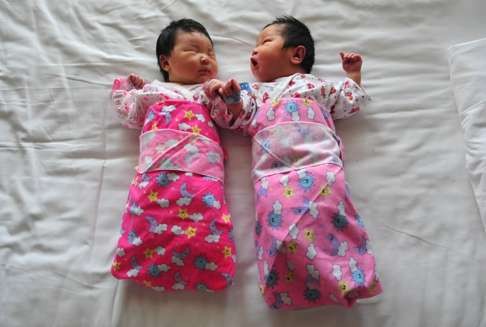
Beijing developers cheer surge of multi-child families as helping absorb luxury property stock
Medical statistics indicate imminent rise of multi-child families following the elimination of one-child policy in January

A baby boom on the Chinese mainland is helping stoke demand for luxury apartments in Beijing, surprising both demographic planners and property developers who hadn’t foreseen that the relaxation of China’s one-child policy earlier this year would lead to the imminent emergence of larger urban families -- and help reduce stocks of high-end projects in the city.
The official number of pregnant women in Beijing in March was the highest for any single month since May 2014, according to data cited by the 21st Century Business Herald. About 400,000 births are expected in the capital this year, exceeding the 360,000 estimated previously, the report said.
Restrictions that limit couples to a single child were formally lifted in January. The Lunar New Year may also explain the boom in parenthood, as many Chinese couples adhere to the traditional belief that babies born in the Year of Monkey are gifted.

The marketing head at Beijing-based agency Yahao Real Estate, Guo Yi, said the baby boom will stimulate demand for large-sized apartments.
“Four bedrooms would be ideal if a family has two kids, as they would need about 140 to 200 square meters,” said Guo.
Guo explained that the trend in Beijing is for children to have their own room, while the parents take the master bedroom. Additional space is also needed for the live in helper.
The baby boom is likely to last for at least a decade according to experts cited by the 21st Century Business Herald.
Meanwhile, Guo said the growing size of urban families could be a welcome match for the excess supply of large-sized apartment projects underway in Beijing.
Sales of high-end residential apartments in the nation’s capital are priced at 70,000 yuan (HK$ 83,700) per square metre.
Guo said she expects new supply of large apartments to reach a peak this year, as authorities have imposed new rules that require developers to provide 70 per cent of flats in a project of 90 square meters or less, as a way to increase home supply and curb prices.
“The price of high-end projects will continue to rise because of dwindling supply,” she said.
In Nanjing, new home prices surged 18 per cent in past year. New apartments are being absorbed at a rate such that the buffer of new stock has shrunk to just two months.
The Nanjing government is believed to have imposed controls to limit the amount which developers can raise prices. A posting that was made on Nanjing’s Xuanwu district’s official Weibo account on Thursday, but deleted later, reportedly said authorities capped the annual price increases at 8 per cent to 12 per cent from the time of the sales launch.
“The new policy may help stop prices from rising too fast in the short term, but it will not fundamentally help the market,” Zhang Hongwei, research director at real estate consultancy Tospur, said.
He added the government would be better off releasing more land to developers.